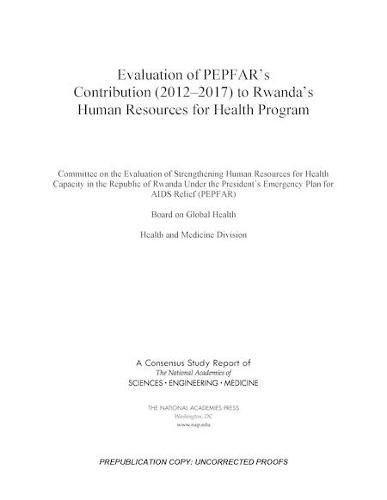Readings Newsletter
Become a Readings Member to make your shopping experience even easier.
Sign in or sign up for free!
You’re not far away from qualifying for FREE standard shipping within Australia
You’ve qualified for FREE standard shipping within Australia
The cart is loading…






Since 2004, the U.S. government has supported the global response to HIV/AIDS through the President’s Emergency Plan for AIDS Relief (PEPFAR). The Republic of Rwanda, a PEPFAR partner country since the initiative began, has made gains in its HIV response, including increased access to and coverage of antiretroviral therapy and decreased HIV prevalence. However, a persistent shortage in human resources for health (HRH) affects the health of people living with HIV and the entire Rwandan population.
Recognizing HRH capabilities as a foundational challenge for the health system and the response to HIV, the Government of Rwanda worked with PEPFAR and other partners to develop a program to strengthen institutional capacity in health professional education and thereby increase the production of high-quality health workers. The Program was fully managed by the Government of Rwanda and was designed to run from 2011 through 2019. PEPFAR initiated funding in 2012. In 2015, PEPFAR adopted a new strategy focused on high-burden geographic areas and key populations, resulting in a reconfiguration of its HIV portfolio in Rwanda and a decision to cease funding the Program, which was determined no longer core to its programming strategy. The last disbursement for the Program from PEPFAR was in 2017.
Evaluation of PEPFAR’s Contribution (2012-2017) to Rwanda’s Human Resources for Health Program describes PEPFAR-supported HRH activities in Rwanda in relation to programmatic priorities, outputs, and outcomes and examines, to the extent feasible, the impact on HRH and HIV-related outcomes. The HRH Program more than tripled the country’s physician specialist workforce and produced major increases in the numbers and qualifications of nurses and midwives. Partnerships between U.S. institutions and the University of Rwanda introduced new programs, upgraded curricula, and improved the quality of teaching and training for health professionals. Growing the number, skills, and competencies of health workers contributed to direct and indirect improvements in the quality of HIV care. Based on the successes and challenges of the HRH program, the report recommends that future investments in health professional education be designed within a more comprehensive approach to human resources for health and institutional capacity building, which would strengthen the health system to meet both HIV-specific and more general health needs. The recommendations offer an aspirational framework to reimagine how partnerships are formed, how investments are made, and how the effects of those investments are documented.
$9.00 standard shipping within Australia
FREE standard shipping within Australia for orders over $100.00
Express & International shipping calculated at checkout
Since 2004, the U.S. government has supported the global response to HIV/AIDS through the President’s Emergency Plan for AIDS Relief (PEPFAR). The Republic of Rwanda, a PEPFAR partner country since the initiative began, has made gains in its HIV response, including increased access to and coverage of antiretroviral therapy and decreased HIV prevalence. However, a persistent shortage in human resources for health (HRH) affects the health of people living with HIV and the entire Rwandan population.
Recognizing HRH capabilities as a foundational challenge for the health system and the response to HIV, the Government of Rwanda worked with PEPFAR and other partners to develop a program to strengthen institutional capacity in health professional education and thereby increase the production of high-quality health workers. The Program was fully managed by the Government of Rwanda and was designed to run from 2011 through 2019. PEPFAR initiated funding in 2012. In 2015, PEPFAR adopted a new strategy focused on high-burden geographic areas and key populations, resulting in a reconfiguration of its HIV portfolio in Rwanda and a decision to cease funding the Program, which was determined no longer core to its programming strategy. The last disbursement for the Program from PEPFAR was in 2017.
Evaluation of PEPFAR’s Contribution (2012-2017) to Rwanda’s Human Resources for Health Program describes PEPFAR-supported HRH activities in Rwanda in relation to programmatic priorities, outputs, and outcomes and examines, to the extent feasible, the impact on HRH and HIV-related outcomes. The HRH Program more than tripled the country’s physician specialist workforce and produced major increases in the numbers and qualifications of nurses and midwives. Partnerships between U.S. institutions and the University of Rwanda introduced new programs, upgraded curricula, and improved the quality of teaching and training for health professionals. Growing the number, skills, and competencies of health workers contributed to direct and indirect improvements in the quality of HIV care. Based on the successes and challenges of the HRH program, the report recommends that future investments in health professional education be designed within a more comprehensive approach to human resources for health and institutional capacity building, which would strengthen the health system to meet both HIV-specific and more general health needs. The recommendations offer an aspirational framework to reimagine how partnerships are formed, how investments are made, and how the effects of those investments are documented.